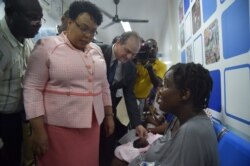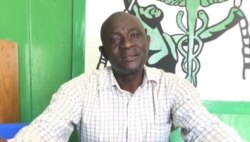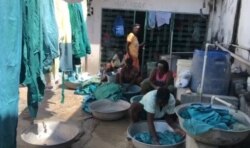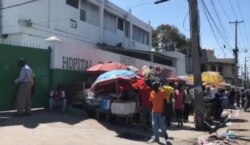Employees at the government-run General Hospital in Haiti’s capital, Port-au-Prince, fear the day when the first coronavirus patient checks in.
Dr. Jacques Mackenzie told VOA that no measures have been taken to protect the staff at the nation’s largest health facility.
“It’s sad to say this but the hospital receives a lot of patients daily and we are not — I repeat — we are not ready, as far as I know, to diagnose a person who has the coronavirus,” he said, adding that they don’t even have the test to determine if someone is infected.
“The diagnosis is biological so the laboratory has to confirm the diagnosis. We don’t have the test. We, the medical personnel, have not received any instructions at all with regards to detecting coronavirus cases, nor how to protect ourselves. We are seeing (in the news) all the equipment other countries have to deal with the coronavirus, their doctors, their technicians are well equipped. We, on the other hand, have never received anything that would allow us to face the possible arrival of coronavirus in the country.”
The statement was in sharp contrast to the assurances given by Public Health Minister Greta Roy Clement earlier this week during a National Palace press event, where she detailed steps the administration is taking to handle possible coronavirus cases.
Health Ministry initiative
Clement told reporters that health officials had been meeting with professionals at institutions such as the Haitian College of Internal Medicine, and epidemiologists and private hospitals, on how to handle coronavirus patients. She said Haiti would follow the World Health Organization (WHO) protocols being adapted for the country. She said those directives were published online this week for anyone who needs them.
For security reasons, “we are not identifying the hospitals which have been designated to receive coronavirus patients, but I will say we have approximately 200 beds available to receive those patients, nationwide at private and public hospitals,” she said.
Clement said the National Health Ministry laboratory received coronavirus test kits on Feb. 12, which will be administered to patients suspected of being infected with the virus. She said samples will be taken from the hospital to the national lab for testing.
Confirmed Caribbean coronavirus cases
There have been no confirmed cases of the coronavirus in Haiti. However, the Dominican Republic, which shares a border with Haiti, announced one confirmed case. The French island of Guadeloupe also reported its first confirmed case of the coronavirus this week. There were no other known cases of coronavirus in the Caribbean as of Friday.
The health minister told reporters that in addition to the protocols in place, the government would be relying on the experience of health professionals who were trained to handle Ebola and cholera patients, and that measures are already in place to screen all passengers before they board planes for Haiti.
At the general hospital, nurse Mary Catherine was unaware of the directives Clement spoke about. She told VOA the arrival of any coronavirus patient would be like pouring salt on an open wound.
“We are already working under conditions that are not normal for most hospitals and now it’s gotten worse. The Ministry of Public Health has never discussed with us its policy for what to do when we receive the first coronavirus case in Haiti,” she said. “The General Hospital is the first place people come. It’s people’s ‘go to’ place when they are ill. But nothing has been said, nothing has been done about the eventuality of coronavirus.”
Haiti’s hospitals were hit hard during the mass anti-government and anti-corruption protests last year, during which roads were barricaded, public sanitation employees stayed home and basic supplies were critically low. As conditions deteriorated, medical professionals took to the streets to join protesters calling for President Jovenel Moise’s ouster.
‘In God’s hands’
Lebien Joseph, president of the medical employees union, says the general hospital staff is basically in God’s hands.
“I don’t think God will allow the coronavirus to enter Haiti,” he said. “Our government operates under a fireman mentality — they wait for the disaster to hit and then they start asking if there is water to extinguish the fire. Then, if they don’t see any water they go out and search for it.”
Inside the hospital’s laundry room, a small group of women were hand-washing items such as gowns and bed linens. The hospital does not have washing machines and dryers. The women told VOA they are not optimistic about surviving the virus, which currently has a mortality rate in the single digits worldwide.
“I believe in God’s grace but believe me, if that virus comes into the country it will kill us all. That’s what I believe,” a female employee said. “I don’t know what others believe, but I believe there’s no way that virus reaches us, and doesn’t destroy us.”
If that happens under the current circumstances, the hospital employees VOA spoke with agree that they do not plan to stick around.
“There are people I’ve spoken to at the hospital who say they plan to leave when the first coronavirus patient arrives, because they don’t want to risk their lives when the government has not given them any tools to face this,” Dr. Mackenzie said.
Nurse Marie Catherine says she is not willing to risk her life if the government doesn’t take proactive measures.
“A lot of the women, the nurses are saying as soon as the coronavirus patients enters the front door they will be exiting from the back door,” she said “They don’t want to risk their own health if the government health officials don’t act to address the situation.”
A female hospital employee agreed.
“They have to do something to prepare us to treat patients adequately. Otherwise we will not risk our lives — we don’t want to die alongside the patients,” she said.
A male patient undergoing treatment told VOA he is anxious about the possibility of coronavirus patients being admitted.
“If I wasn’t sick I’d head home, but I don’t have a choice so I’ll just deal with whatever happens,” he said.
The only thing Clement and the people VOA spoke with at the hospital agree on is that “coronavirus is everyone’s problem.”
More than 100,000 people worldwide have been infected with the coronavirus, and 3,400 have died. Most of the deaths were in China, where the pandemic is believed to have originated.
VOA's Renan Toussaint in Port-au-Prince contributed to this report.










